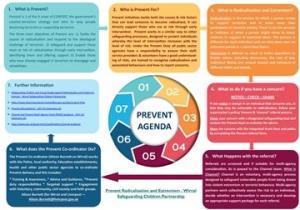Preventing Radicalisation (Prevent)
What is Prevent? – The Prevent Strategy is focused on safeguarding individuals who are vulnerable to radicalisation by stopping them being drawn into terrorism or extremism. The threat we face from terrorism is real, and the Prevent Strategy aims to stop people becoming terrorists or supporting terrorism.
Prevent is supported by three objectives:
- respond to the ideological challenge of terrorism and the threat we face from those who promote it.
- prevent people from being drawn into terrorism and ensure they are given appropriate advice and support.
- work with key sectors and institutions where there are risks of radicalisation and address risks.
By focusing on early intervention before any illegal activity takes place, it’s not about catching terrorists, it’s about identifying people who are, or may be at risk of radicalisation, and supporting them to change direction in a way that will help them.
How to spot the signs
Radicalisation can happen both in person or online. Visit ACT Early to find out about the signs that someone may be vulnerable to radicalisation.
If there is an immediate threat, always call 999.
How to report a concern or make a referral
Merseyside Police have a dedicated Prevent Team who can be contacted for advice:
Telephone: 0151 777 8506 or email [email protected]
You can also contact the national police Prevent advice line 0800 011 3764, in confidence, to share your concerns with specially trained officers.
To make a referral, please complete the Prevent Referral form and send it to [email protected].
- if the person is under 18 also send the form to: [email protected]
- if the person is over 18 also send the form to: [email protected].
- if you’re not sure, please send the form to all three email addresses above.
Report a non-Prevent safeguarding concern
Report neglect or abuse of an adult or for further advice and information about adult safeguarding, please visit the Wirral Safeguarding Adults Partnership Board
https://www.gov.uk/government/publications/prevent-duty-guidance
https://www.gov.uk/government/publications/channel-and-prevent-multi-agency-panel-pmap-guidance
To be read in conjunction with WSCP’s Prevent for practitioners page
The statutory Prevent guidance summarises the requirements on schools in terms of four general themes:
- risk assessment
- working in partnership
- staff training
- IT policies
Schools are expected to assess the risk of children being drawn into terrorism, including support for extremist ideas that are part of terrorist ideology. This means being able to demonstrate both a general understanding of the risks affecting children and young people in the area and a specific understanding of how to identify individual children who may be at risk of radicalisation and what to do to support them. Schools and colleges should have clear procedures in place for protecting children at risk of radicalisation.
The Prevent guidance refers to the importance of Prevent awareness training to equip staff to identify children at risk of being drawn into terrorism and to challenge extremist ideas. Individual schools are best placed to assess the training needs of staff in the light of their assessment of the risk to pupils at the school of being drawn into terrorism. As a minimum, however, schools should ensure that the designated safeguarding lead undertakes Prevent awareness training and is able to provide advice and support to other members of staff on protecting children from the risk of radicalisation.
What makes a young person vulnerable to radicalisation & extremism?
- Possession of literature related to extreme views.
- Extremist influences.
- Experience of poverty, disadvantage or social exclusion.
- Rejected by peer, faith, social group or family.
- Pressure from peers associated with extremism.
- Identity confusion.
- Conflict with family over religious beliefs and or lifestyle choices/extreme political views.
- Victim or witness to race or religious hate crime.
Do you recognise this person? Could you spot the signs?
- Being at a transitional time of life.
- A need for identity, meaning and belonging.
- Being influenced or controlled by a group.
- Opportunistic involvement.
- A desire for status.
- Social networks or involvement in extremism.
- Susceptibility to indoctrination.
- A desire for political or moral change.
- A need to dominate and control others.
- An event or series of traumatic events for both the person or global/national.
As a Designated Safeguarding Lead (DSL), you may want to book onto a Prevent training session. Before you do, need to download and digest the pre-reading on Prevent and Radicalisation, to do this, click here. To book onto a WSCP session click here.
There is a 7 minute briefing to use with staff click on the picture below:
UPDATED PREVENT GUIDANCE FOR SCHOOLS
Prevent duty self-assessment tool for schools
Self-assessment tool to help schools in England review their responsibilities under the Prevent duty.
The Prevent duty: safeguarding learners vulnerable to radicalisation
Support for those working in education settings with safeguarding responsibilities.
PREVENT POLICY
There is no requirement for schools to have a separate Prevent Policy, as this can be incorporated into your safeguarding policy, however there is an annual template your schools may wish to use here:
Free Prevent Projects for Secondary School Aged Children
OddArts – interactive drama performance exploring how every day grievances can be used by different extremist ideologies and weaponised to fragment communities and saw hatred. Available for Y7 and older.

Small Steps – this is a session exploring extremist right wing ideologies and looks at what is the radicalisation process, what are the consequences and where to turn for support. Available for Y9 and older. For more information click on the link – LCR Small Steps for Young People
There are also resources and support for Primary Schools, you can find them here: Ariel Trust Free Training
Managing Prevent in Schools- Accessing advice, support and guidance
Prevent Duty Guidance for England and Wales
Prevent FAQ’s and support (Oct 2023)
Useful Website Links:

